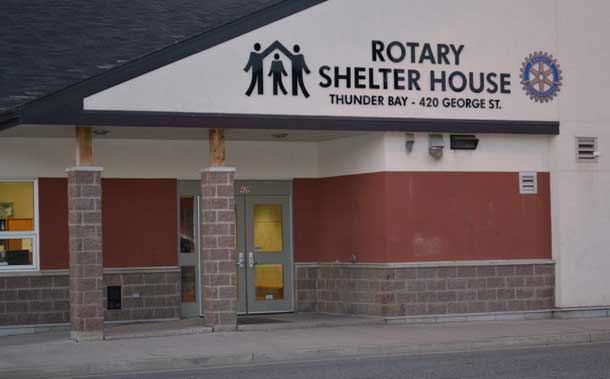
THUNDER BAY – In March of 2012, Shelter House opened the doors to the new Managed Alcohol Program, in response to crisis calls from community partners about the high rates of public intoxication in the City of Thunder Bay. The Kwae Kii Win Centre (Turning Point in Ojibwe) follows the design of the Seaton House Annex Program in Toronto, Ontario and provides stable, supportive living for homeless people with severe and chronic alcohol use problems.
The program was intended to demonstrate to the community and multiple orders of government that it is a cost-effective and humane solution to public intoxication and longstanding homelessness.
Shelter House seeks solutions
The program houses 15 men and women. The typical client is between 30 and 45, and has spent a minimum of five years on the streets, often having been homeless or at risk of homelessness for most of their lives. Upon admission to the program, clients are often in extremely poor health, with untreated chronic illnesses such as hepatitis and diabetes, longstanding infections and injuries that have never been properly addressed. All are long term residents or clients of Shelter House, who have had short periods of housing punctuated by longer term absolute homelessness, often living outdoors when shelter is unavailable or when the weather is warmer.
The annual costs of services to support a homeless person living on the streets can reach $130,000 annually (Calgary Homelessness Foundation, 2008). Supporting individuals without housing is costly because of the intensive use of emergency services, including health, enforcement and transportation, along with the expense of emergency sheltering.
The managed alcohol program currently costs about 30,882 per person based on 15 beds. This cost saves about 100,000 annually in the care of the individual, as well drastically improving quality of life and community safety.
Kwae Kii Win Centre residents benefit from the regular medical attention they receive through a partnership with Northwest Community Health Centres nd are supported to increase personal responsibility through self-care, cooking, tending to personal needs such as laundry and correspondence.
Not only do participants benefit from the program, but the community also realizes economic and social benefits to providing provisional housing for individuals with severe and chronic alcohol use problems. Thunder Bay Police Service has indicated that time spent managing intoxicated residents of Kwae Kii Win Centre is significantly reduced as they can return residents to the Centre if they are intoxicated in the community. This represents a less intensive manner of managing the issue, as it reduces the requirement for processing people at the holding cell or waiting at the emergency room.
Through regular vaccinations and treatment of chronic infectious disease, residents are able to reduce their contraction of infectious disease. Better prevention reduces the spread of infectious disease. Prevention includes appropriate treatment, access to condoms and education about infectious disease, and better hygiene methods.
Understandably, public intoxication is concerning to residents in Thunder Bay. Kwae Kii Win Centre reduces the number of individuals who are drinking in public places and contributes to an overall increased sense of community order.
The Centre for Addiction Research British Columbia has been contracted to evaluate the Kwae Kii Win Centre for outcome and quality of life measures. Data is being collected on the following:
• Hospital usage rates
• Arrests/incarcerations
• Alcohol consumption (palatable and non-palatable)
• Withdrawal management usage
• Health outcomes
• Quality of life reports
The outcome of this evaluation will be available by December 2013 and will be disseminated broadly with Council and community stakeholders.
We know that this program creates improved health and safety, not only for the residents, but also for the community at large. Shelter House continues to seek ways to sustain the program in the years to come.
Patti Hajdu
Shelter House
Executive Director at Shelter House Thunder Bay













